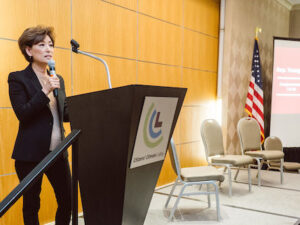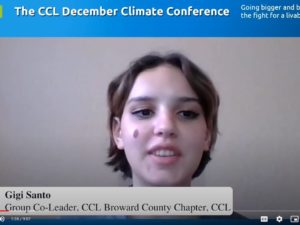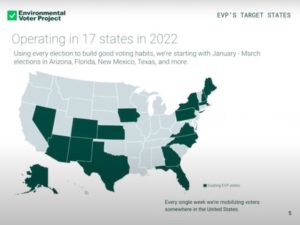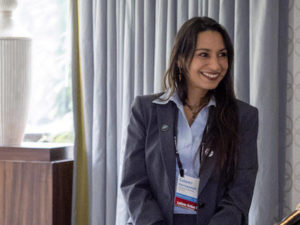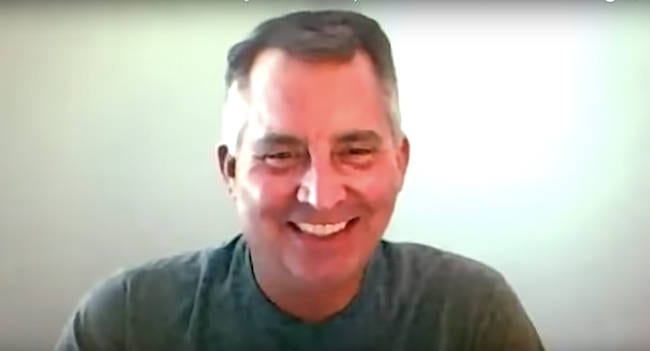
Former Republican congressman from Florida, David Jolly
By Sara Wanous
Each month, Citizens’ Climate Lobby hosts an online meeting featuring a guest speaker to educate listeners on topics related to climate change and our Carbon Fee and Dividend proposal. Check out recaps of past speakers here.
“#CallYourCongressman,” read former Rep. David Jolly’s (R-FL) shirt when he joined Citizens’ Climate Lobby’s October 2018 national call. Jolly’s shirt captured his political philosophy of engagement and bipartisanship that we saw when he was one of the first members of Congress to join the Climate Solutions Caucus and to sign the Republican Climate Resolution. Mark Reynolds, CCL’s Executive Director who hosts the monthly call, described him as always being “the most thoughtful person in the room” and “the person always looking from the broadest point of view,” making his political insight into today’s news particularly valuable.
The midterms
Midterm elections on Nov. 6 are rapidly approaching, and candidates, organizations, and citizens across the country are eager to see which political parties emerge with majorities in the House and Senate. Jolly posited that if we took a “snapshot” of that day, it looked most likely that the House will flip to a Democratic majority, and the Senate will remain Republican-dominated. However, he was also careful to acknowledge that many factors play into this political calculus, and two in particular make the midterms uncertain. Firstly, David Jolly pointed out that “our polling truly has not caught up with the emergence of social media.” Even when social media is accounted for in polling, the estimated intensity of its effects are often wrong. Jolly is also keeping an eye on the “Kavanaugh bump,” or the political energy generated by the controversial confirmation of Supreme Court Justice Brett Kavanaugh. Kavanaugh’s confirmation energized both Republican and Democratic voters, but is unclear whether it may have closed the enthusiasm gap between the two and whether it will remain as politically salient as it is now through the elections.
Rep. Carlos Curbelo’s (R-FL) race is another interesting one to watch, as he is the chair of the Climate Solutions Caucus and recently introduced an infrastructure bill that included a price on carbon as a source of funding. David Jolly described Curbelo as “one of those members who does his very best to represent his district first and his party second,” as we see in his leadership on climate issues, which affect his low-lying Florida district. Jolly said stances like these are why Curbelo remains competitive as a Republican in a Democrat-leaning district. Jolly believes that if Curbelo loses, it would not be related to his stance on climate, but the result of a national “wave” of voters favoring Democrats.
Benefits of bipartisanship
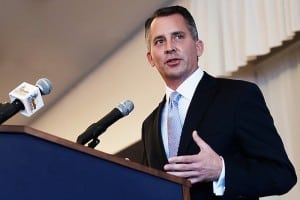
When he was in Congress, Rep. David Jolly was an early member of the bipartisan Climate Solutions Caucus
David Jolly is known for his commitment to bipartisanship and advocates for the benefits of a divided government. To provide some context, Reynolds and Jolly looked back at a politically parallel moment to today’s events. In 2009, former Rep. Bob Inglis (R-SC) introduced the Raise Wages Lower Carbon Act that included a price on carbon. After this bill failed, Republicans saw mixed consequences: Jeff Flake who supported the bill was not politically harmed by it. In fact, he was elevated to Senate. But simultaneously, the popularity of the Tea Party and climate denial rose, and Bob Inglis ultimately lost his House seat. But a lot has changed since then. Curbelo has introduced the Market Choice Act, and six Republicans voted against the Scalise anti-carbon tax resolution for the first time ever. Will Republicans who embrace carbon pricing and climate solutions come out ahead or fall behind? Will the Republican party as a whole embrace these ideas, or distance themselves they did in 2009?
Jolly believes that we “have to have an honest conversation that there are more legislators willing to approach climate solutions on the Democratic side than the Republican side, and we’re always going to come up against this.” However, with this in mind, Jolly sees great opportunities emerging for Republican climate leaders like Carlos Curbelo if the House flips. Currently, Republicans who want to work on climate change issues get pushback from the leadership of their own party, but a Democrat-controlled House could provide more “breathing room” for Republican climate leaders. David Jolly describes that a Democratic majority “will bring to the forefront leaders like Carlos Curbelo and his Republican peers that are trying to talk about this issue.”
Conservative conversations about the IPCC report
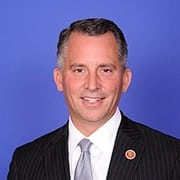
David Jolly served in Congress from 2014-2017
In most cases, CCL encourages conversations about climate solutions rather than the nitty gritty of climate science. However, given the urgency of the most recent IPCC report that indicates “doomsday” scenarios within a generation, it could be a compelling and meaningful way to start a conversation with Republican representatives. Jolly agreed that if the report is moving and compelling to you, you should follow your convictions and bring it up with your member of Congress. In doing so, he recommended following his “three rules of approaching a legislator.”
- Keep it personal. The IPCC report lays out scenarios that would dramatically change our ways of life in the next generation, which is a real, personal connection. Jolly said, “We should expect that our legislators, regardless of party, understand it’s personal to us, and we are asking for their assistance.”
- Keep it professional. We must be realistic about what our legislators can do for us. It is important to support members taking incremental actions toward climate solutions and to continue build room for them to do so, even if they aren’t moving as quickly as we would prefer them to.
- Keep it parochial. This is where citizens hold members of Congress accountable for their actions and votes. “Listen, this is your member of Congress,” Jolly leveled. “You’re allowed to say, ‘I expect you to vote this way, and my decision on whether to support you may or may not be influenced by that.’”
These points, paired with other CCL conservative communication strategies, provide a relatable and constructive basis for a conversations about climate solutions with Republicans. Overall, approaching Republican legislators about the IPCC report does not mean asking them to completely change their beliefs. It means asking them to address “what is legitimate climate science,” and as Jolly put it, giving them an opening to “create an opportunity for industry to emerge more profitable, to transform industry, and to ultimately translate cost savings down to every one of [their] constituents.”
To hear more from former Rep. David Jolly, including some Q&A with CCL volunteers, watch the entire October meeting on YouTube or listen to the podcast.
Sara Wanous has been the Membership Coordinator at Citizens’ Climate Lobby since January 2018. She has a B.A. in Economics and B.S. in Environmental Science and Policy from Chapman University and is pursuing a masters in Climate Science and Policy at the Scripps Institution of Oceanography.

